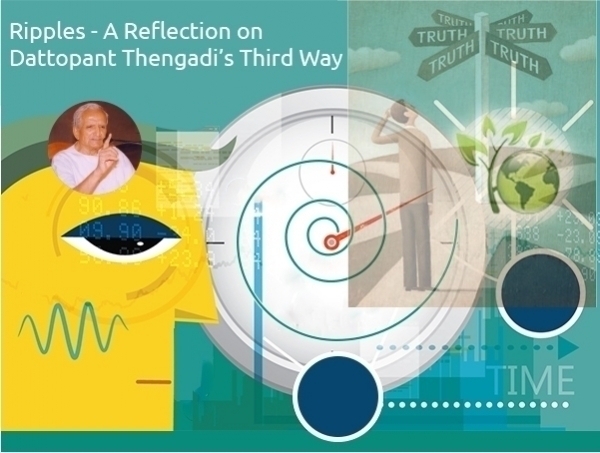Ripples A Reflection On Dattopant Thengadi's Third Way - Part 18
This paper acknowledges the emergence of new classes, "knowledge classes", which play a meaningful role.
Total Views |
I have been reflecting in my own way on Dattopant Thengadi Ji's Third Way. I present these small "ripples" that it has caused in my mind in a series. I am glad it has found its resonance in many thinking minds alike. I hope the readers have read the earlier article in the series before moving ahead.
 (The paper circulated and discussed among intellectuals in October 1992)
(The paper circulated and discussed among intellectuals in October 1992)
Any technology is a tool, it cannot discover a law of nature. It may some time give rise to serious problems.
Similarly when new technology is to be implemented in a new socio-economic conditions,it is essential that all the factors related to it should be studied carefully to minimise the harmful or unfavorable impact on social conditions.
'Social,economic and institutional framework' is to be created for the changing conditions. Both foreign and domestic technology ought to be used for the judicious use of resources. Proper negotiations for the best terms and conditions are necessary. Mass mobilisation in participation and application of technology is to be paid attention to.
Obviously Dattopant favours indigenous technology and our own research and development base. He wants us to focus on some points.
1) We should have national technological policy to determine which portion of western technology is to be adopted and the quartes where our technology can be essentially evolved.
2) Need to carefully analyse the area where traditional technology can be of use.
3) It is to be in tune with our socio-cultural pattern which should lead to decentralisation and a possibility of converting home as a unit of production.
4) Suitable modifications in traditional techniques without running a risk of increase in unemployment, wastage of skills and decapitalisation of the means of productions.

Also Read: Ripples A Reflection On Dattopant Thengadi's Third Way - Part 17
This paper acknowledges the emergence of a new classes, 'knowledge classes', which play a meaningful role. He specially refers to scientists and technologists. All developed countries, he describes, would have huge 'knowledge industries'. The men of knowledge would play the central role in the new era.
It was observed that the new technology could replace mannual or blue collar workers considerably. This was in a way a very serious problem as the opportunity for this class was shrinking. At the same time it was obvious that the new technology could exhaust the natural resources too. Of course there were critics who could foresee the problems.
There were voices which cautioned the world about the consequences and suggested some measures too. Alwin Toffler ( a leading futuristic thinker) pleaded for social control of technology.( Dattopant refers to his writings and the measures) Alwin explains that social indicators should be considered in planning. The concept of technological ombudsman is also discussed by him in this context. The influence on humanity is to be made an integral part of the planning. No change can be only econometric, short ranged and without the consultation with people.(Econometrics uses economic theory, mathematics, and statistical inference to quantify economic phenomena.)
The impact on social structure will have to be measured. The value system of the society can't be ignored. The quality, quantity and pace of advancement is to be discussed. It is to be judged whether the society is ready to adapt itself to the advancement. The unguided and unrestricted change can cause a serious damage to society. The science itself cannot be exactly aware of the direction it is moving in. It might pose ethical and moral dilemmas which may not be solved by facts alone. ( Reference- the book by Dr Lero Augustin, Let us play God.)
In developing countries such advanced technologies creat an island like economic zone. They depend on same level technological zones outside the underdeveloped zones and do not promote growth of local subsidiaries. This creates a crisis which may result into the beginning of foreign economic imperialism. Developed countries use them as a dumping ground for their old technology.
Similarly when new technology is to be implemented in a new socio-economic conditions,it is essential that all the factors related to it should be studied carefully to minimise the harmful or unfavorable impact on social conditions.
'Social,economic and institutional framework' is to be created for the changing conditions. Both foreign and domestic technology ought to be used for the judicious use of resources. Proper negotiations for the best terms and conditions are necessary. Mass mobilisation in participation and application of technology is to be paid attention to.
Obviously Dattopant favours indigenous technology and our own research and development base. He wants us to focus on some points.
1) We should have national technological policy to determine which portion of western technology is to be adopted and the quartes where our technology can be essentially evolved.
2) Need to carefully analyse the area where traditional technology can be of use.
3) It is to be in tune with our socio-cultural pattern which should lead to decentralisation and a possibility of converting home as a unit of production.
4) Suitable modifications in traditional techniques without running a risk of increase in unemployment, wastage of skills and decapitalisation of the means of productions.

